
Ethics of eating meat
Encyclopedia
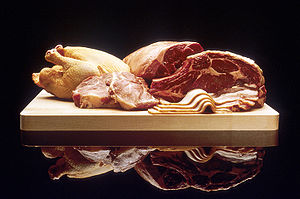
Animal husbandry
Animal husbandry is the agricultural practice of breeding and raising livestock.- History :Animal husbandry has been practiced for thousands of years, since the first domestication of animals....
of meat. Reasons for objecting to the practice of killing animals for consumption may include animal rights
Animal rights
Animal rights, also known as animal liberation, is the idea that the most basic interests of non-human animals should be afforded the same consideration as the similar interests of human beings...
, environmental ethics
Environmental ethics
Environmental ethics is the part of environmental philosophy which considers extending the traditional boundaries of ethics from solely including humans to including the non-human world...
, and/or religious reasons. Some people, while not vegetarians, refuse to eat the flesh of certain animals due to cultural taboo
Taboo
A taboo is a strong social prohibition relating to any area of human activity or social custom that is sacred and or forbidden based on moral judgment, religious beliefs and or scientific consensus. Breaking the taboo is usually considered objectionable or abhorrent by society...
, such as cats, dogs, horses, or rabbits. Others support meat eating for scientific, nutritional and cultural reasons, including religious ones. Some meat eaters abstain from the meat of animals reared in particular ways, such as factory farms, or avoid certain meats, such as veal
Veal
Veal is the meat of young cattle , as opposed to meat from older cattle. Though veal can be produced from a calf of either sex and any breed, most veal comes from male calves of dairy cattle breeds...
or foie gras
Foie gras
Foie gras ; French for "fat liver") is a food product made of the liver of a duck or goose that has been specially fattened. This fattening is typically achieved through gavage corn, according to French law, though outside of France it is occasionally produced using natural feeding...
. Some people follow vegetarian or vegan diets not because of moral concerns involving the production of meat and other animal products in general, but the treatment involving the raising and slaughter of animals.
Ethics of killing for food
Princeton UniversityPrinceton University
Princeton University is a private research university located in Princeton, New Jersey, United States. The school is one of the eight universities of the Ivy League, and is one of the nine Colonial Colleges founded before the American Revolution....
professor and pioneer of the animal liberation movement
Animal liberation movement
The animal-liberation movement, sometimes called the animal-rights movement, animal personhood, or animal-advocacy movement, is a social movement which seeks an end to the rigid moral and legal distinction drawn between human and non-human animals, an end to the status of animals as property, and...
, Peter Singer
Peter Singer
Peter Albert David Singer is an Australian philosopher who is the Ira W. DeCamp Professor of Bioethics at Princeton University and Laureate Professor at the Centre for Applied Philosophy and Public Ethics at the University of Melbourne...
, believes that if alternative means of survival exist, one ought to choose the option that does not cause unnecessary harm to animals. Most ethical vegetarians argue that the same reasons exist against killing animals to eat as against killing humans to eat. Singer, in his book Animal Liberation
Animal Liberation (book)
Animal Liberation is a book by Australian philosopher Peter Singer, published in 1975.The book is widely considered within the animal liberation movement to be the founding philosophical statement of its ideas...
listed possible qualities of sentience in non-human creatures that gave such creatures the scope to be considered under utilitarian ethics
Utilitarianism
Utilitarianism is an ethical theory holding that the proper course of action is the one that maximizes the overall "happiness", by whatever means necessary. It is thus a form of consequentialism, meaning that the moral worth of an action is determined only by its resulting outcome, and that one can...
, and this has been widely referenced by animal rights campaigners and vegetarians. Ethical vegetarians also believe that killing an animal, like killing a human, can only be justified in extreme circumstances and that consuming a living creature for its enjoyable taste, convenience, or nutritional value is not sufficient cause. Another common view is that humans are morally conscious of their behavior in a way other animals are not, and therefore subject to higher standards.
This same argument is used by others to counter the treatment of animals as moral equals with humans. Equality in a moral community
Moral community
A moral community is a group of people drawn together by a common interest in living according to a particular moral philosophy.Moral communities are typically associated with a religion and advocate that religion's conception of a good life. The congregation of a church, synagogue, or mosque is a...
requires the capability of all participants to make moral decisions. Animals are incapable of making ethical choices; for example, a tiger would not refrain from eating a human because it was wrong, it would decide whether to attack based on what it felt would allow it to survive.
Thus, some opponents of ethical vegetarianism describe the comparison of eating livestock with killing people to be fallacious. Humans are capable of culture, innovation and the sublimation of instinct in order to act in an ethical manner. Animals are not, and so are by definition unequal to humans on a moral level. This does not excuse cruelty, but it does mean animals are not morally equivalent to humans and do not possess the rights a human has. For example, killing a mouse is not the moral equivalent of committing homicide.
Benjamin Franklin
Benjamin Franklin
Dr. Benjamin Franklin was one of the Founding Fathers of the United States. A noted polymath, Franklin was a leading author, printer, political theorist, politician, postmaster, scientist, musician, inventor, satirist, civic activist, statesman, and diplomat...
describes his conversion to vegetarianism in chapter one of his autobiography, but then he describes why he (periodically) ceased vegetarianism in his later life:
A 2011 study demonstrates that when people are confronted with the harm that their meat-eating brings to food animals, they view those animals as possessing fewer mental capacities compared to when they are not reminded. This is especially evident when people expect to eat meat in the near future. Such denial makes it less troublesome for people to eat animals. The research argues that meat eaters go to great lengths to overcome these inconsistencies between their beliefs and behaviour.
Treatment of animals
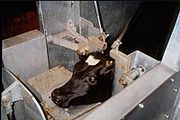
Factory farming
Factory farming is a term referring to the process of raising livestock in confinement at high stocking density, where a farm operates as a factory — a practice typical in industrial farming by agribusinesses. The main products of this industry are meat, milk and eggs for human consumption...
, faster communications, and environmental consciousness. Some believe that the current mass demand for meat cannot be satisfied without a mass-production system that disregards the welfare of animals, while others believe that practices like well-managed free-ranging and consumption of game, particularly from species whose natural predators have been significantly eliminated, could substantially alleviate the demand for mass-produced meat.
Various programs operate in the U.S. that promote the notion that animals raised for food are treated humanely, but Farm Sanctuary
Farm Sanctuary
Farm Sanctuary is an American animal protection organization, founded in 1986 as an advocate for farm animals. It promotes laws and policies that support animal welfare, animal protection and vegetarianism/veganism through rescue, education and advocacy...
believes that commodifying and slaughter
Animal slaughter
Slaughter is the term used to describe the killing and butchering of animals, usually for food. Commonly it refers to killing and butchering of domestic livestock ....
ing animals is incompatible with the definition of "humane," which according to the Webster's Dictionary
Webster's Dictionary
Webster's Dictionary refers to the line of dictionaries first developed by Noah Webster in the early 19th century, and also to numerous unrelated dictionaries that added Webster's name just to share his prestige. The term is a genericized trademark in the U.S.A...
, means "characterized by kindness, mercy or compassion".
Defenders of factory farming argue that the animals are better off in total confinement. According to F J "Sonny" Faison, president of Carroll’s Foods:
Animal consciousness
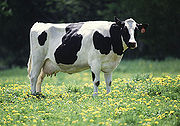
Eugene Linden
Eugene Linden is an American author of several non-fiction books ....
, author of The Parrot's Lament suggests there are many examples of animal behavior and intelligence that surpass what people would suppose to be the boundary of animal consciousness. Linden contends that in many of these documented examples, a variety of animal species exhibits behavior that can only be attributed to emotion, and to a level of consciousness that we would normally ascribe only to our own species.
Philosopher Daniel Dennett
Daniel Dennett
Daniel Clement Dennett is an American philosopher, writer and cognitive scientist whose research centers on the philosophy of mind, philosophy of science and philosophy of biology, particularly as those fields relate to evolutionary biology and cognitive science. He is currently the Co-director of...
counters that:
This position is further developed with the argument that sentience (being aware of one's surroundings) does not equate to consciousness (being aware of oneself as an individual). Generally only the handful of animals that have passed the mirror test
Mirror test
The mirror test is a measure of self-awareness, as animals either possess or lack the ability to recognize themselves in a mirror.The test was developed by Gordon Gallup Jr. in 1970, based in part on observations made by Charles Darwin. While visiting a zoo, Darwin held a mirror up to an orangutan...
are considered to be conscious.
Peter Singer
Peter Singer
Peter Albert David Singer is an Australian philosopher who is the Ira W. DeCamp Professor of Bioethics at Princeton University and Laureate Professor at the Centre for Applied Philosophy and Public Ethics at the University of Melbourne...
maintains that many livestock animals are of sufficient sentience
Sentience
Sentience is the ability to feel, perceive or be conscious, or to have subjective experiences. Eighteenth century philosophers used the concept to distinguish the ability to think from the ability to feel . In modern western philosophy, sentience is the ability to have sensations or experiences...
to deserve better treatment than they often receive (this, according to his ethical philosophy: personism
Personism
Personism is a life stance that has been called the philosophy of Peter Singer. It amounts to a branch of secular humanism with different rights-criteria. The main distinction is that personists believe that rights are conferred to the extent that a creature is a person...
).
Pain
A related argument revolves around non-human organisms' ability to feel painPain
Pain is an unpleasant sensation often caused by intense or damaging stimuli such as stubbing a toe, burning a finger, putting iodine on a cut, and bumping the "funny bone."...
. If animals can be shown to suffer in a way similar or identical to humans, many of the arguments against human suffering could then, presumably, be extended to animals. Others have argued that pain can be demonstrated by averse reactions to negative stimuli that are non-purposeful or even maladaptive. One such reaction is transmarginal inhibition
Transmarginal inhibition
In psychology, Transmarginal inhibition, or TMI, is an organism's response to overwhelming stimuli.-Research:Ivan Pavlov enumerated details of TMI on his work of conditioning animals to pain. He found that organisms had different levels of tolerance...
, a phenomenon observed in humans and some animals akin to mental breakdown
Mental breakdown
Mental breakdown is a non-medical term used to describe an acute, time-limited phase of a specific disorder that presents primarily with features of depression or anxiety.-Definition:...
.
As noted by John Webster, a professor of animal husbandry at Bristol:
Detractors have advanced a slippery slope
Slippery slope
In debate or rhetoric, a slippery slope is a classic form of argument, arguably an informal fallacy...
counterargument. On a cellular level, cooking a plant subjects its cells to a violent death, while eating a plant raw still leads to corrosive chemical attack on the cells by the stomach's gastric acid
Gastric acid
Gastric acid is a digestive fluid, formed in the stomach. It has a pH of 1 to 2 and is composed of hydrochloric acid , and large quantities of potassium chloride and sodium chloride...
. Although a plant does not possess a nervous system, its cells are still living organisms that respond to external stimuli. Taken to the extremes this implies that eating anything that has not already died a natural death is unethical.
The main response to the slippery slope argument is to draw a line somewhere among the organisms. It is debatable where exactly this line should be drawn. Justin Leiber, a philosophy professor at Oxford University writes that:
Environmental argument
Some people choose to follow a vegetarian or vegan lifestyle for environmental reasons.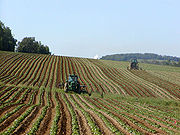
Monoculture
Monoculture is the agricultural practice of producing or growing one single crop over a wide area. It is also known as a way of farming practice of growing large stands of a single species. It is widely used in modern industrial agriculture and its implementation has allowed for large harvests from...
that is common in industrialized agriculture, typically for feed crops such as corn
Maize
Maize known in many English-speaking countries as corn or mielie/mealie, is a grain domesticated by indigenous peoples in Mesoamerica in prehistoric times. The leafy stalk produces ears which contain seeds called kernels. Though technically a grain, maize kernels are used in cooking as a vegetable...
and soy is more damaging to ecosystem
Ecosystem
An ecosystem is a biological environment consisting of all the organisms living in a particular area, as well as all the nonliving , physical components of the environment with which the organisms interact, such as air, soil, water and sunlight....
s than more sustainable farming practices such as organic farming
Organic farming
Organic farming is the form of agriculture that relies on techniques such as crop rotation, green manure, compost and biological pest control to maintain soil productivity and control pests on a farm...
, permaculture
Permaculture
Permaculture is an approach to designing human settlements and agricultural systems that is modeled on the relationships found in nature. It is based on the ecology of how things interrelate rather than on the strictly biological concerns that form the foundation of modern agriculture...
, arable
Arable land
In geography and agriculture, arable land is land that can be used for growing crops. It includes all land under temporary crops , temporary meadows for mowing or pasture, land under market and kitchen gardens and land temporarily fallow...
, pastoral
Pastoral
The adjective pastoral refers to the lifestyle of pastoralists, such as shepherds herding livestock around open areas of land according to seasons and the changing availability of water and pasturage. It also refers to a genre in literature, art or music that depicts such shepherd life in an...
, and rain-fed agriculture
Agriculture
Agriculture is the cultivation of animals, plants, fungi and other life forms for food, fiber, and other products used to sustain life. Agriculture was the key implement in the rise of sedentary human civilization, whereby farming of domesticated species created food surpluses that nurtured the...
. Other concerns include the wasting of natural resources, such as food, water, etc.
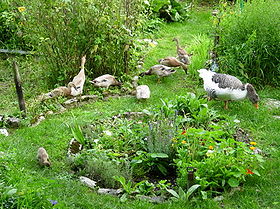
United States Department of Agriculture
The United States Department of Agriculture is the United States federal executive department responsible for developing and executing U.S. federal government policy on farming, agriculture, and food...
, growing crops for farm animals requires nearly half of the U.S.
United States
The United States of America is a federal constitutional republic comprising fifty states and a federal district...
water supply and 80% of its agricultural land. Animals raised for food in the U.S. consume 90% of the soy crop, 80% of the corn crop, and 70% of its grain. In tracking food animal production from the feed through to the dinner table, the inefficiencies of meat, milk
Milk
Milk is a white liquid produced by the mammary glands of mammals. It is the primary source of nutrition for young mammals before they are able to digest other types of food. Early-lactation milk contains colostrum, which carries the mother's antibodies to the baby and can reduce the risk of many...
and egg
Egg (food)
Eggs are laid by females of many different species, including birds, reptiles, amphibians, and fish, and have probably been eaten by mankind for millennia. Bird and reptile eggs consist of a protective eggshell, albumen , and vitellus , contained within various thin membranes...
production range from a 4:1 energy input to protein output ratio up to 54:1. The result is that producing animal-based food is typically much less efficient than the harvesting of grains, vegetables, legumes, seeds and fruits, though this might not be true to the same extent for animal husbandry in the developing world where factory farming is almost non existent, making animal-based food much more sustainable.
The concept of anthropocentrism, or human-centeredness, alleges that unequal treatment of humans and animals constitutes a form of bias. Val Plumwood (1993, 1996) has argued that anthropocentrism plays an analogous role in green theory to androcentrism
Androcentrism
Androcentrism is the practice, conscious or otherwise, of placing male human beings or the masculine point of view at the center of one's view of the world and its culture and history...
in feminist theory and ethnocentrism
Ethnocentrism
Ethnocentrism is the tendency to believe that one's ethnic or cultural group is centrally important, and that all other groups are measured in relation to one's own. The ethnocentric individual will judge other groups relative to his or her own particular ethnic group or culture, especially with...
in anti-racist theory. Plumwood calls human-centredness "anthropocentrism" to emphasize this parallel.
Defenders of anthropocentrist views maintain that a healthy, sustainable environment is necessary for human well-being rather than for its own sake.
Debate over animals killed in crop harvesting
Steven Davis, a professor of animal scienceAnimal science
Animal Science is described as "studying the biology of animals that are under the control of mankind". Historically, the animals studied were farm animals, including livestock and horses, but courses available now look at a far broader area to include companion animals, for example dogs, cats and...
at Oregon State University, argues that the least harm principle does not require giving up all meat. Davis states that a diet containing beef from grass-fed ruminants such as cattle would kill fewer animals than a vegetarian diet particularly when one takes into account animals killed by agriculture. This conclusion has been criticized as flawed because it calculates the number of animals killed per acre (instead of per consumer). When his numbers are changed, Davis' argument ends up showing veganism as perpetrating the least harm. Additionally, his argument has been criticized for being based on only two studies that may not represent commercial agricultural practices. Larger number of studies again show veganism to do the "least harm".
See also
- Abolitionism (animal rights)Abolitionism (animal rights)Abolitionism within the animal rights movement is the idea that focusing on animal welfare reform not only fails to challenge animal suffering, but may prolong it by making the exercise of property rights over animals appear acceptable. The abolitionists' objective is to secure a moral and legal...
- Animal ChaplainsAnimal chaplainsAnimal chaplains community, including pet loss grief support, animal memorial services, praying for animals who are sick or injured, comforting bereaved family members, holding hands with pet owners during surgery or animal euthanasia at a veterinary clinic or animal hospital, and performing...
- Animal rightsAnimal rightsAnimal rights, also known as animal liberation, is the idea that the most basic interests of non-human animals should be afforded the same consideration as the similar interests of human beings...
- Animal testingAnimal testingAnimal testing, also known as animal experimentation, animal research, and in vivo testing, is the use of non-human animals in experiments. Worldwide it is estimated that the number of vertebrate animals—from zebrafish to non-human primates—ranges from the tens of millions to more than 100 million...
- Animal welfareAnimal welfareAnimal welfare is the physical and psychological well-being of animals.The term animal welfare can also mean human concern for animal welfare or a position in a debate on animal ethics and animal rights...
- Gene BaurGene BaurGene Baur is an activist, best-selling author, and president and co-founder of Farm Sanctuary, the first animal rescue organization dedicated to farmed animals. He is vegan and has been at the forefront of animal rights since he began the Sanctuary in 1986.Baur grew up in Hollywood, California,...
- Earth (2007 film)Earth (2007 film)Earth is a 2007 nature documentary film which depicts the diversity of wild habitats and creatures across the planet. The film begins in the Arctic in January of one year and moves south, finishing in Antarctica in the December of the same year...
, a nature documentary film which depicts the diversity of wild habitats and creatures across the planet - Economic vegetarianismEconomic vegetarianismAn economic vegetarian is a person who practices vegetarianism from either the philosophical viewpoint that the consumption of meat is expensive, part of a conscious simple living strategy or just because of necessity...
- Emotion in animalsEmotion in animalsThere is no scientific consensus on emotion in animals, that is, what emotions certain species of animals, including humans, feel. The debate concerns primarily mammals and birds, although emotions have also been postulated for other vertebrates and even for some invertebrates.Animal lovers,...
- Environmental vegetarianismEnvironmental vegetarianismEnvironmental vegetarianism is the practice of vegetarianism or veganism based on the indications that animal production, particularly by intensive agriculture, is environmentally unsustainable...
- Factory farmingFactory farmingFactory farming is a term referring to the process of raising livestock in confinement at high stocking density, where a farm operates as a factory — a practice typical in industrial farming by agribusinesses. The main products of this industry are meat, milk and eggs for human consumption...
- Farm SanctuaryFarm SanctuaryFarm Sanctuary is an American animal protection organization, founded in 1986 as an advocate for farm animals. It promotes laws and policies that support animal welfare, animal protection and vegetarianism/veganism through rescue, education and advocacy...
- Food guide pyramidFood guide pyramidA food guide pyramid is a triangular or pyramid-shaped nutrition guide divided into sections to show the recommended intake for each food group. The first food pyramid was published in Sweden in 1974. The most widely known food pyramid was introduced by the United States Department of Agriculture...
- In vitro meatIn vitro meatIn vitro meat, also known as cultured meat, is an animal flesh product that has never been part of a complete, living animal.This form of meat has been described, sometimes derisively, as "laboratory-grown" meat. In vitro meat should not be confused with imitation meat, which is a vegetarian food...
- Ingrid NewkirkIngrid NewkirkIngrid Newkirk is a British-born animal rights activist and president of People for the Ethical Treatment of Animals , the world's largest animal rights organization...
- MeatMeatMeat is animal flesh that is used as food. Most often, this means the skeletal muscle and associated fat and other tissues, but it may also describe other edible tissues such as organs and offal...
- Moral agencyMoral agencyMoral agency is a person's ability to make moral judgments and take action that comport with morality.A Moral agent is "a being who is capable of acting with reference to right and wrong"-Development and analysis:...
- People for the Ethical Treatment of AnimalsPeople for the Ethical Treatment of AnimalsPeople for the Ethical Treatment of Animals is an American animal rights organization based in Norfolk, Virginia, and led by Ingrid Newkirk, its international president. A non-profit corporation with 300 employees and two million members and supporters, it claims to be the largest animal rights...
- SpeciesismSpeciesismSpeciesism is the assigning of different values or rights to beings on the basis of their species membership. The term was created by British psychologist Richard D...
- Sustainable food system
- VeganismVeganismVeganism is the practice of eliminating the use of animal products. Ethical vegans reject the commodity status of animals and the use of animal products for any purpose, while dietary vegans or strict vegetarians eliminate them from their diet only...
- VegetarianismVegetarianismVegetarianism encompasses the practice of following plant-based diets , with or without the inclusion of dairy products or eggs, and with the exclusion of meat...
External links
- The moral basis of vegetarianism (1959) e-book by Mahatma GandhiMahatma GandhiMohandas Karamchand Gandhi , pronounced . 2 October 1869 – 30 January 1948) was the pre-eminent political and ideological leader of India during the Indian independence movement...
- The Ethics of Diet: A Catena of Authorities Deprecatory of the Practice of Flesh-Eating by Howard WilliamsHoward Williams (humanitarian)Howard Williams was an English humanitarian and vegetarian, and author of the book The Ethics of Diet, an anthology of vegetarian thought....
M.A. (1837–1931) - The Ethical Vegetarian

